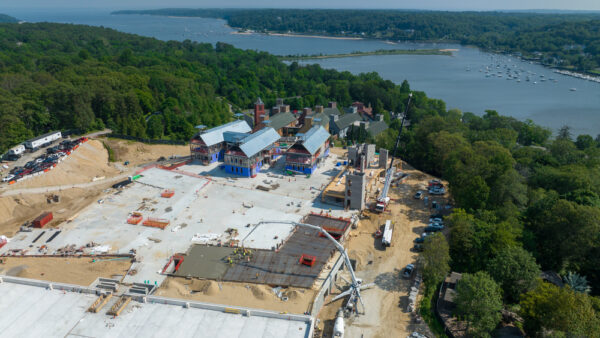People living or working in large buildings such as apartment towers or hospitals may be at higher risk of catching Covid-19 if their plumbing is not working properly, a water supply and sanitation expert has warned.
Where U-bends under sink, toilet and other drains have been allowed to run dry, virus-laden droplets from the building’s sewage system can enter rooms, hang in the air and settle on surfaces, said Dr. Michael Gormley, director of the Water Academy at Heriot-Watt University in Edinburgh.
Normally U-bends are filled with water, creating a seal to block airborne diseases rising from the sewer system.
Building managers must not ignore unexplained foul smells in bathrooms, kitchens, or washing areas, and should make sure all sinks and toilets have a functioning U-bend. (More advice follows below.)
The insight stems from an investigation into mass deaths at a high-rise complex in Hong Kong, called Amoy Gardens (pictured), during the SARS outbreak in 2003.
Among its 19,000 residents, there were more than 300 confirmed SARS cases and 42 deaths, accounting for around a sixth of all SARS fatalities in Hong Kong as a whole.
Organisms can be transmitted between rooms on different floors of a building through the airflow system that helps water to move around the plumbing– Dr. Michael Gormley, Heriot-Watt University
The World Health Organization suggested that defects in plumbing at Amoy Gardens were to blame because a large number of the U-bends in bathrooms there had been dry.
People infected with SARS had diarrhea in the toilets in the building, so airborne droplets could travel from one apartment to another.
“This airborne transmission route was aided by bathroom extraction fans which drew contaminated air into rooms,” Gormley wrote in an article published yesterday in The Conversation. Â
Gormley and co-researchers tested the hypothesis by building a full-scale, two-story, wastewater plumbing rig.
They used a model organism to represent pathogens flushed into the system, and made the U-bends dry, as they were in Amoy Gardens.
The experiment, with results published in 2017, confirmed the theory.
“Sure enough, this showed that such organisms can be transmitted between rooms on different floors of a building through the airflow system that helps water to move around the plumbing,” Gormley wrote.
“Not only were the organisms in the air in rooms, the droplets contaminated surfaces in these rooms and inside the system itself.”
Exacerbating the problem, when large numbers of people are at home, big buildings are more prone to pressure surges from overuse, which can force water out of U-bends.
Gormley listed six suggestions for facilities managers and homeowners-particularly those in tall buildings-to ensure their systems are safe during lockdown:
- Do not ignore unexplained foul smells in bathrooms, kitchens, or washing areas.
- Make sure all sinks and toilets have a functioning U-bend.
- Pour water into all sinks and toilets for at least five seconds in the morning and evening, paying special attention to floor drains in bathrooms and wet rooms.
- If the wastewater pipework from a toilet, sink, or other household appliance appears to be disconnected or open, seal it immediately. Use a rubber glove to cover the end, or a plastic bag and some tape will suffice.
- If there appears to be any crack or leak in pipework, seal it with strong tape.
- Facilities managers should continually monitor the whole system performance of their buildings, looking out for things such as drainage problems or bad smells.
Image: Amoy Gardens residential complex in Hong Kong (Wmwiki/CC BY 3.0)
Comments
Comments are closed.







The virus is not air borne it is inert. If no contact to a human is made the virus disintegrates in quite a short space of time. in modern technology terms the virus is like a USB, useless unless plugged in. Clean hands and surfaces like plastic and stainless steel. Disinfect